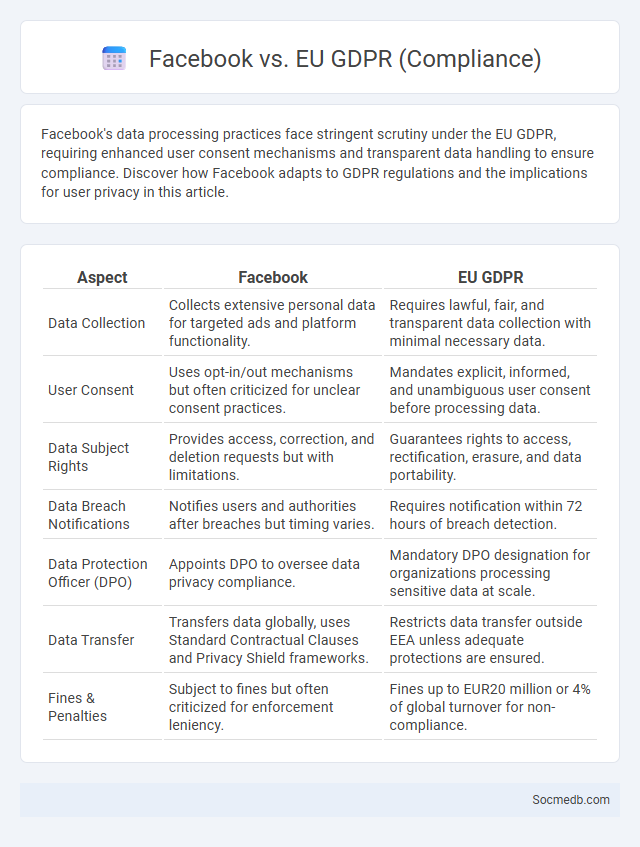
Photo illustration: Facebook vs EU GDPR (Compliance)
Facebook's data processing practices face stringent scrutiny under the EU GDPR, requiring enhanced user consent mechanisms and transparent data handling to ensure compliance. Discover how Facebook adapts to GDPR regulations and the implications for user privacy in this article.
Table of Comparison
| Aspect | EU GDPR | |
|---|---|---|
| Data Collection | Collects extensive personal data for targeted ads and platform functionality. | Requires lawful, fair, and transparent data collection with minimal necessary data. |
| User Consent | Uses opt-in/out mechanisms but often criticized for unclear consent practices. | Mandates explicit, informed, and unambiguous user consent before processing data. |
| Data Subject Rights | Provides access, correction, and deletion requests but with limitations. | Guarantees rights to access, rectification, erasure, and data portability. |
| Data Breach Notifications | Notifies users and authorities after breaches but timing varies. | Requires notification within 72 hours of breach detection. |
| Data Protection Officer (DPO) | Appoints DPO to oversee data privacy compliance. | Mandatory DPO designation for organizations processing sensitive data at scale. |
| Data Transfer | Transfers data globally, uses Standard Contractual Clauses and Privacy Shield frameworks. | Restricts data transfer outside EEA unless adequate protections are ensured. |
| Fines & Penalties | Subject to fines but often criticized for enforcement leniency. | Fines up to EUR20 million or 4% of global turnover for non-compliance. |
Introduction to Facebook, GDPR, and Data Breaches
Facebook operates as a leading social media platform connecting over 2.9 billion monthly active users worldwide, facilitating communication and content sharing. The General Data Protection Regulation (GDPR) enforces strict data privacy and protection standards for Facebook users within the European Union, requiring transparency and user consent for data collection. Data breaches on Facebook have highlighted vulnerabilities, prompting enhanced security measures and increased regulatory scrutiny to safeguard personal information.
Overview of the EU GDPR Compliance Requirements
The EU General Data Protection Regulation (GDPR) mandates that social media platforms ensure transparent data processing practices, obtain explicit user consent, and provide users with rights to access, rectify, and erase personal data. Organizations must implement strict data security measures, conduct regular privacy impact assessments, and appoint Data Protection Officers for compliance monitoring. Non-compliance can result in penalties up to EUR20 million or 4% of annual global turnover, highlighting the critical importance of GDPR adherence in social media operations.
Facebook’s Approach to Data Privacy
Facebook's approach to data privacy centers on giving users control over their information through customizable privacy settings and transparent data policies. The platform employs advanced encryption and frequent security updates to safeguard personal data from unauthorized access. You can enhance your privacy by regularly reviewing these settings and staying informed about Facebook's data usage practices.
Key GDPR Violations and Facebook’s Legal Challenges
Social media platforms, especially Facebook, face significant legal challenges due to key GDPR violations such as inadequate user consent mechanisms, improper data processing, and insufficient transparency in data handling. Your personal data on Facebook is often scrutinized under the GDPR framework to ensure it is collected and used lawfully, with recent fines highlighting the consequences of non-compliance. Understanding these violations helps users protect their privacy and hold platforms accountable for their data protection practices.
Notable Facebook Data Breach Incidents
Notable Facebook data breach incidents include the 2019 exposure of 540 million user records due to unsecured servers and the 2018 Cambridge Analytica scandal affecting 87 million profiles. These breaches compromised personal information such as phone numbers, email addresses, and private messages, posing significant privacy risks. Understanding these incidents helps you safeguard your data by adjusting privacy settings and being cautious about app permissions.
Impact of Data Breaches on User Trust and Privacy
Data breaches on social media platforms significantly undermine user trust by exposing personal information such as email addresses, phone numbers, and private messages, leading to increased vulnerability to identity theft and fraud. Privacy concerns escalate as compromised data can be exploited for targeted phishing attacks and unauthorized data sharing. Users increasingly demand stronger encryption, transparent data policies, and robust security measures to protect their digital identities and maintain confidence in social media services.
Fines and Penalties Imposed by the EU on Facebook
The European Union has imposed significant fines and penalties on Facebook for violations related to data privacy, misinformation, and antitrust issues, reflecting stringent enforcement of the General Data Protection Regulation (GDPR). These penalties highlight the importance of compliance with EU digital regulations and underscore the risks your social media activities may face if not aligned with legal standards. Understanding these enforcement actions can help you navigate the complexities of social media governance in the EU context.
Steps Facebook Has Taken to Achieve GDPR Compliance
Facebook has implemented several measures to achieve GDPR compliance, including enhancing user consent mechanisms by providing clearer information on data collection and usage. The platform has introduced more robust privacy settings, enabling users to control their personal data and manage ad preferences effectively. Data processing agreements have been updated with partners, and tools for data portability and erasure have been made readily accessible to meet regulatory requirements.
Lessons Learned: Best Practices for Data Protection
Implementing robust encryption protocols and regular security audits significantly enhance data protection on social media platforms. User education on privacy settings and phishing awareness reduces the risk of data breaches and unauthorized access. Strict compliance with GDPR and CCPA regulations ensures that personal information is handled responsibly and transparently.
Future Outlook: Facebook’s Ongoing Compliance Challenges
Facebook faces persistent regulatory scrutiny as global data privacy laws evolve, requiring continuous adaptation to avoid hefty fines and operational restrictions. The platform invests heavily in AI-driven content moderation technologies to better manage misinformation and harmful content in real time. Ongoing compliance challenges are expected to shape Facebook's strategic focus, influencing product development, user engagement policies, and international market approaches.
 socmedb.com
socmedb.com